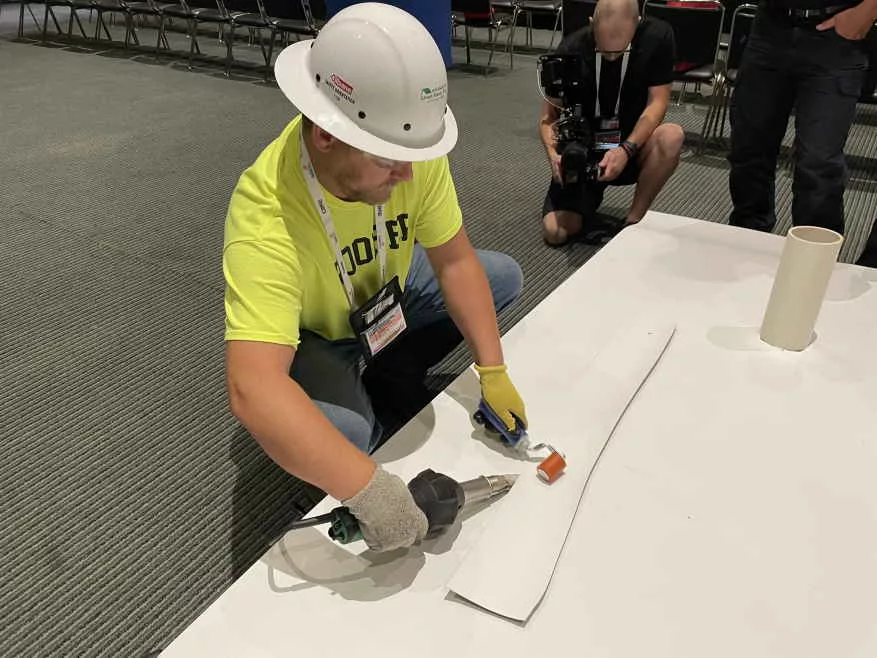Roofers Put Skills on Display at SkillsUSA
Students and apprentices from around the U.S. compete in over 100 hands-on skills tests

-include-in-the-construction-competition.webp?t=1656709766&width=1080)
ATLANTA – More than 5,200 student competitors from around the country were among the 12,000 attendees that descended on the Georgia World Congress Center in Atlanta for the first in-person, post-COVID-19 National Leadership and Skills Conference (NLSC) June 20-24. Students arrived from all over the U.S. to participate in over 100 hands-on and leadership skills competitions.
Since 1965, SkillsUSA has been hard at work empowering its members to become world-class leaders and responsible American citizens. SkillsUSA is a national membership association serving high school, college and middle school students who are preparing for careers in trade, technical and skilled service occupations, including, among others, construction trades. SkillsUSA is a partnership of students, teachers and industry working together to ensure America has a skilled workforce. SkillsUSA helps each student excel.
According to their mission statement, SkillsUSA, “…improves the quality of our nation’s future skilled workforce through the development of SkillsUSA Framework skills that include Personal, Workplace and Technical Skills grounded in academics.” Working in partnership with more than 650 business, industry and labor organizations, SkillsUSA seeks to produce the most highly-skilled workforce in the world, providing the opportunity for successful careers in the trades.
While the SkillsUSA skills competitions include a significant representation of the construction trades, it never included roofing. For many reasons, the roofing industry has never actively participated in the career and technical education (CTE) space. But all of that is in the midst of changing.
Two years ago, the National Roofing Contractors Association (NRCA) became an industry partner and supporter of SkillsUSA. The goal of NRCA has been to bring training for careers in roofing into CTE schools across the nation. To participate in the skills competition, every trade must have students enrolled in CTE programs focused on the trade. In addition to this, any new skills competition proposed must be vetted by a committee to make sure it follows the standards of SkillsUSA competitions.
Over the course of the past two years, NRCA has worked with the National Center for Construction Education and Research (NCCER) to overhaul the roofing curriculum for CTE schools. NCCER is recognized throughout the CTE community as the qualified source for construction course curricula. Working together, NRCA and NCCER have set forth a plan to take students through a course of study and hands-on experiences that will, at the end of the courses and required trade experience, qualify the students to stand for the professional certification by way of the NRCA’s ProCertification ® program.
Beginning with NRCA’s Training for Roof Application Careers (TRAC) course of study, students may move on to the two-phase NCCER course while obtaining hands-on experience working in the trade. The TRAC program is meant to prepare students to enter the trade at the base level. Once a student has made it through these courses and gained sufficient field experience, they may take the written and hands-on test required for professional certification. ProCertification credentials belong to the individual and are portable between roofing companies anywhere in the U.S. Some state code bodies are exploring ways to include certified roofers as a code requirement in their jurisdictions.
Most recently, the NRCA added a member to their staff to oversee the transition into the CTE community. John Esbenshade is NRCA’s Director of Workforce Development and is working to bring roofing contractors and their local CTE schools together to bring about the inclusion of roofing into their construction course and to work on courses specifically for roofing. NRCA contractor members are finding there are many opportunities in their local markets to partner with CTE schools and to take advantage of funding provided by the Perkins Act and other federally-funded initiatives.
In 2022 the NRCA introduced roofing to the SkillsUSA NLSC by way of a demonstration of thermoplastic membranes installations. NRCA member, Tim Stephens, Architectural Sheet Metal, Inc., Orlando, Fla., provided a demonstration of TPO welding using the same roof deck mock-up required for use in testing for ProCertification. Instructors and students not only took a great deal of interest in the demonstrations, but asked good follow-up questions.
Esbenshade and Stephens were joined by NRCA’s Vice President of ProCertification, John Schehl, for a seminar outlining NRCA’s efforts with the NCCER curriculum-review project and the career path of TRAC, NCCER courses and experience leading to ProCertification. It was further explained that college credits were available through TRAC and ProCertification.
For the first time ever, roofing was included in the construction skills competition. Not as a stand-alone trade, but as part of the competition that pitted four-person crews building a small structure from a set of plans. NRCA participated in the specifications for as well as the judging of the roofing portion of the builds. This is just the beginning. As roofing-specific courses are offered by CTE schools, roofing competitions will become part of SkillsUSA competitions at the state and national level.
There should be no argument that the industry needs more roofing workers in all phases of the trade. Thermoplastic membranes bubble to the top as they command over half the low-slope market, but TRAC and the ProCertification programs are not limited to thermoplastics. The programs will ultimately cover every type of roofing system as well as a professional certification for foremen.
Follow these links for more information on the NRCA, TRAC, ProCertification, NCCER, the Perkins Act, and SkillsUSA. And if you want to see an amazing show of construction skills by the top CTE students in the country, come to Atlanta next year for the SkillsUSA NLSC.
Looking for a reprint of this article?
From high-res PDFs to custom plaques, order your copy today!





